初中英语条件状语从句语法点和习题(含答案)
- 格式:docx
- 大小:16.34 KB
- 文档页数:3

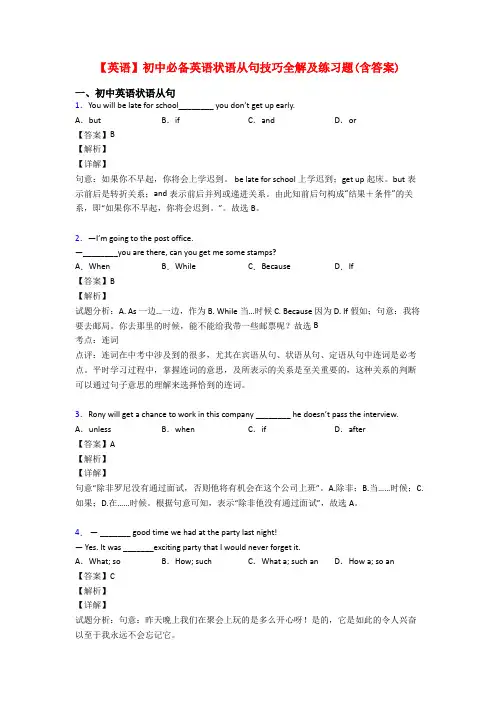
【英语】初中必备英语状语从句技巧全解及练习题(含答案)一、初中英语状语从句1.You will be late for school________ you don’t get up early.A.but B.if C.and D.or【答案】B【解析】【详解】句意:如果你不早起,你将会上学迟到。
be late for school上学迟到;get up起床。
but表示前后是转折关系;and表示前后并列或递进关系。
由此知前后句构成“结果+条件”的关系,即“如果你不早起,你将会迟到。
”。
故选B。
2.—I’m going to the post office.—________you are there, can you get me some stamps?A.When B.While C.Because D.If【答案】B【解析】试题分析:A. As 一边…一边,作为 B. While当…时候 C. Because 因为 D. lf假如;句意:我将要去邮局。
你去那里的时候,能不能给我带一些邮票呢?故选B考点:连词点评:连词在中考中涉及到的很多,尤其在宾语从句、状语从句、定语从句中连词是必考点。
平时学习过程中,掌握连词的意思,及所表示的关系是至关重要的,这种关系的判断可以通过句子意思的理解来选择恰到的连词。
3.Rony will get a chance to work in this company ________ he doesn’t pass the interview. A.unless B.when C.if D.after【答案】A【解析】【详解】句意“除非罗尼没有通过面试,否则他将有机会在这个公司上班”。
A.除非;B.当……时候;C.如果;D.在……时候。
根据句意可知,表示“除非他没有通过面试”,故选A。
4.— _______ good time we had at the party last night!— Yes. It was _______exciting party that I would never forget it.A.What; so B.How; such C.What a; such an D.How a; so an【答案】C【解析】【详解】试题分析:句意:昨天晚上我们在聚会上玩的是多么开心呀!是的,它是如此的令人兴奋以至于我永远不会忘记它。
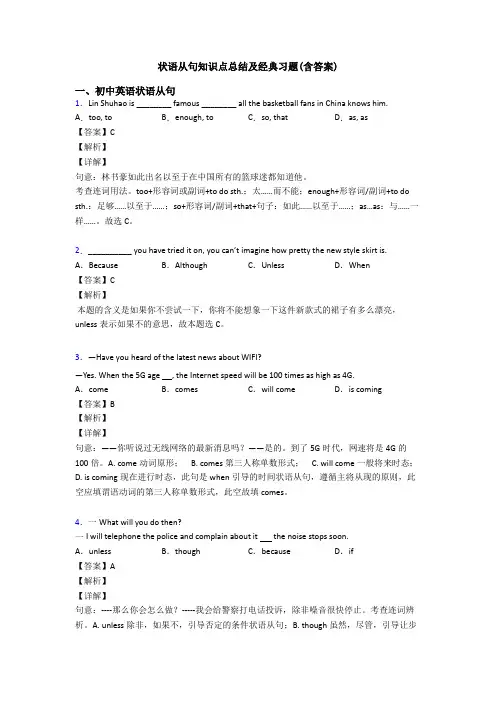
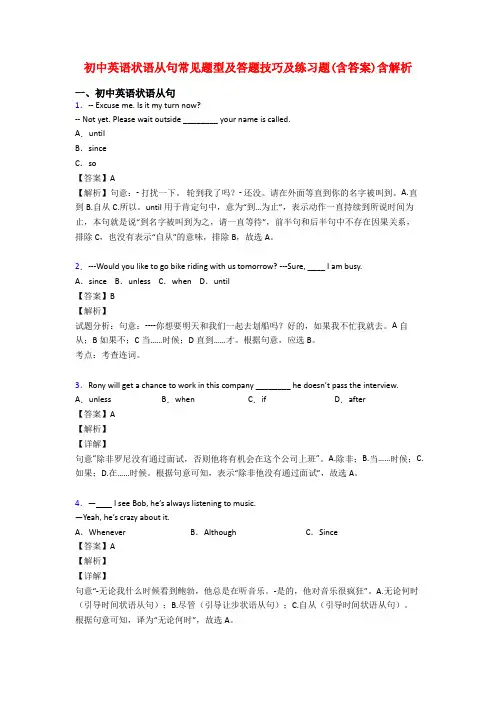
初中英语状语从句常见题型及答题技巧及练习题(含答案)含解析一、初中英语状语从句1.-- Excuse me. Is it my turn now?-- Not yet. Please wait outside ________ your name is called.A.untilB.sinceC.so【答案】A【解析】句意:- 打扰一下。
轮到我了吗?- 还没。
请在外面等直到你的名字被叫到。
A.直到B.自从C.所以。
until用于肯定句中,意为“到…为止”,表示动作一直持续到所说时间为止,本句就是说“到名字被叫到为之,请一直等待”,前半句和后半句中不存在因果关系,排除C,也没有表示“自从”的意味,排除B,故选A。
2.---Would you like to go bike riding with us tomorrow? ---Sure, ____ I am busy.A.since B.unless C.when D.until【答案】B【解析】试题分析:句意:----你想要明天和我们一起去划船吗?好的,如果我不忙我就去。
A自从;B如果不;C当……时候;D直到……才。
根据句意,应选B。
考点:考查连词。
3.Rony will get a chance to work in this company ________ he doesn’t pass the interview. A.unless B.when C.if D.after【答案】A【解析】【详解】句意“除非罗尼没有通过面试,否则他将有机会在这个公司上班”。
A.除非;B.当……时候;C.如果;D.在……时候。
根据句意可知,表示“除非他没有通过面试”,故选A。
4.— I see Bob, he’s always listening to music.—Yeah, he’s crazy about it.A.Whenever B.Although C.Since【答案】A【解析】【详解】句意“-无论我什么时候看到鲍勃,他总是在听音乐。
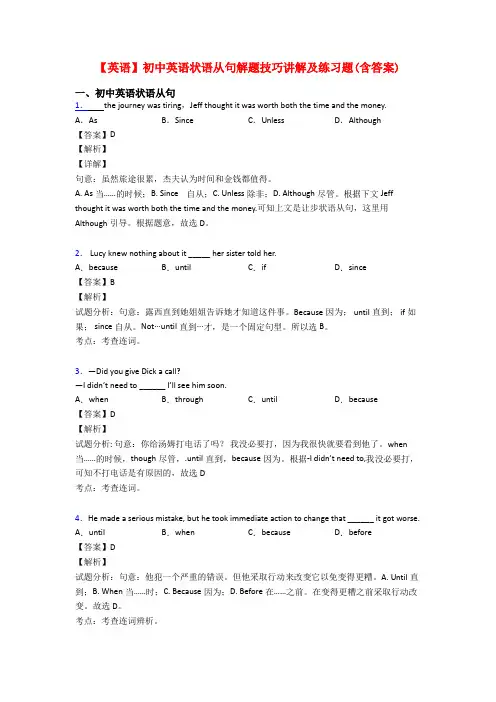
【英语】初中英语状语从句解题技巧讲解及练习题(含答案)一、初中英语状语从句1. the journey was tiring,Jeff thought it was worth both the time and the money.A.As B.Since C.Unless D.Although【答案】D【解析】【详解】句意:虽然旅途很累,杰夫认为时间和金钱都值得。
A. As当……的时候;B. Since 自从;C. Unless除非;D. Although尽管。
根据下文Jeff thought it was worth both the time and the money.可知上文是让步状语从句,这里用Although引导。
根据题意,故选D。
2. Lucy knew nothing about it _____ her sister told her.A.because B.until C.if D.since【答案】B【解析】试题分析:句意:露西直到她姐姐告诉她才知道这件事。
Because因为; until直到; if如果; since自从。
Not···until直到···才,是一个固定句型。
所以选B。
考点:考查连词。
3.—Did you give Dick a call?—I didn’t need to ______ I’ll see him soon.A.when B.through C.until D.because【答案】D【解析】试题分析: 句意:你给汤姆打电话了吗?我没必要打,因为我很快就要看到他了。
when 当……的时候,though尽管,.until直到,because因为。
根据-I didn’t need to,我没必要打,可知不打电话是有原因的,故选D考点:考查连词。
4.He made a serious mistake, but he took immediate action to change that ______ it got worse. A.until B.when C.because D.before【答案】D【解析】试题分析:句意:他犯一个严重的错误。
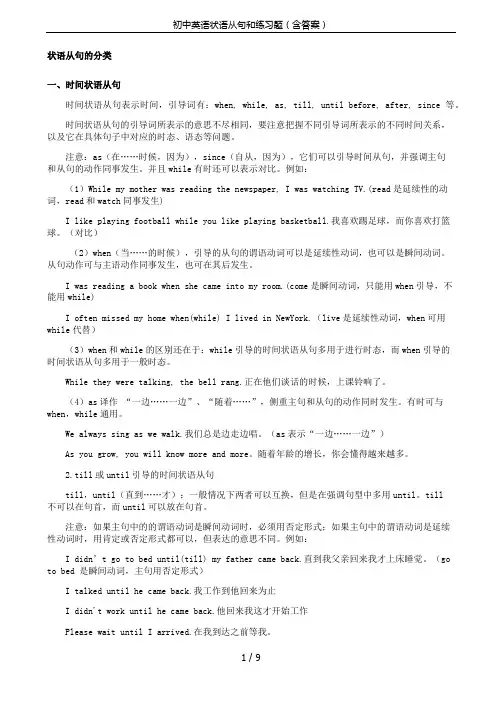
状语从句的分类一、时间状语从句时间状语从句表示时间,引导词有:when, while, as, till, until before, after, since等。
时间状语从句的引导词所表示的意思不尽相同,要注意把握不同引导词所表示的不同时间关系,以及它在具体句子中对应的时态、语态等问题。
注意:as(在……时候,因为),since(自从,因为),它们可以引导时间从句,并强调主句和从句的动作同事发生。
并且while有时还可以表示对比。
例如:(1)While my mother was reading the newspaper, I was watching TV.(read是延续性的动词,read和watch同事发生)I like playing football while you like playing basketball.我喜欢踢足球,而你喜欢打篮球。
(对比)(2)when(当……的时候),引导的从句的谓语动词可以是延续性动词,也可以是瞬间动词。
从句动作可与主语动作同事发生,也可在其后发生。
I was reading a book when she came into my room.(come是瞬间动词,只能用when引导,不能用while)I often missed my home when(while) I lived in NewYork.(live是延续性动词,when可用while代替)(3)when和while的区别还在于:while引导的时间状语从句多用于进行时态,而when引导的时间状语从句多用于一般时态。
While they were talking, the bell rang.正在他们谈话的时候,上课铃响了。
(4)as译作“一边……一边”、“随着……”,侧重主句和从句的动作同时发生。
有时可与when,while通用。
We always sing as we walk.我们总是边走边唱。
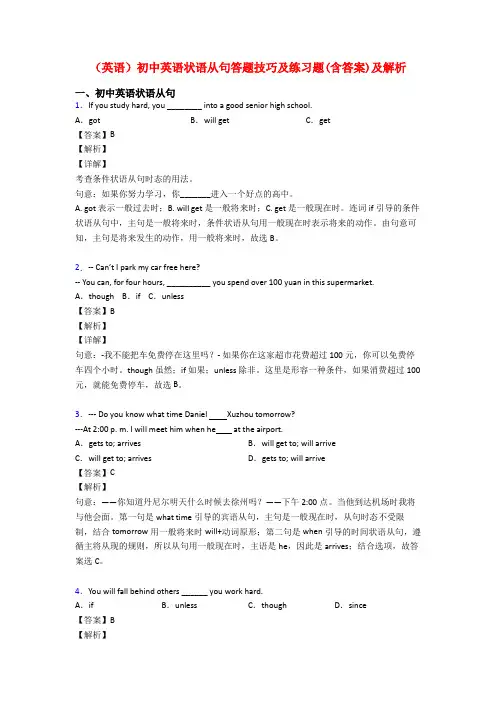
(英语)初中英语状语从句答题技巧及练习题(含答案)及解析一、初中英语状语从句1.If you study hard, you ________ into a good senior high school.A.got B.will get C.get【答案】B【解析】【详解】考查条件状语从句时态的用法。
句意:如果你努力学习,你_______进入一个好点的高中。
A. got 表示一般过去时;B. will get 是一般将来时;C. get 是一般现在时。
连词if引导的条件状语从句中,主句是一般将来时,条件状语从句用一般现在时表示将来的动作。
由句意可知,主句是将来发生的动作,用一般将来时,故选B。
2.-- Can’t I park my car free here?-- You can, for four hours, __________ you spend over 100 yuan in this supermarket. A.though B.if C.unless【答案】B【解析】【详解】句意:-我不能把车免费停在这里吗?- 如果你在这家超市花费超过100元,你可以免费停车四个小时。
though 虽然;if 如果;unless 除非。
这里是形容一种条件,如果消费超过100元,就能免费停车,故选B。
3.--- Do you know what time Daniel Xuzhou tomorrow?---At 2:00 p. m. I will meet him when he at the airport.A.gets to; arrives B.will get to; will arriveC.will get to; arrives D.gets to; will arrive【答案】C【解析】句意:——你知道丹尼尔明天什么时候去徐州吗?——下午2:00点。
当他到达机场时我将与他会面。
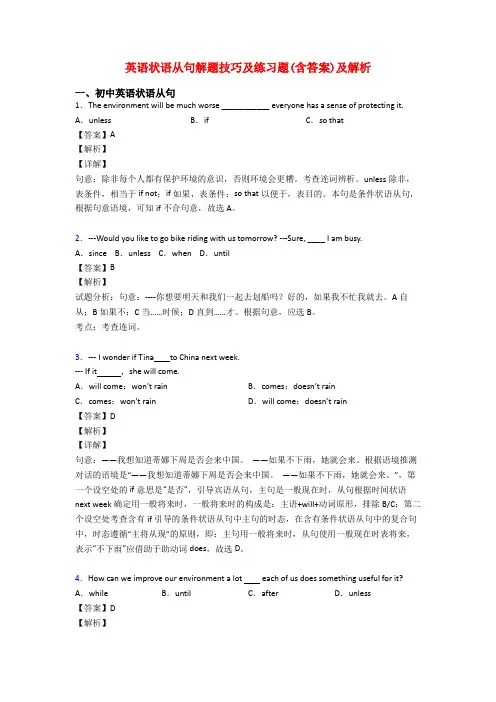
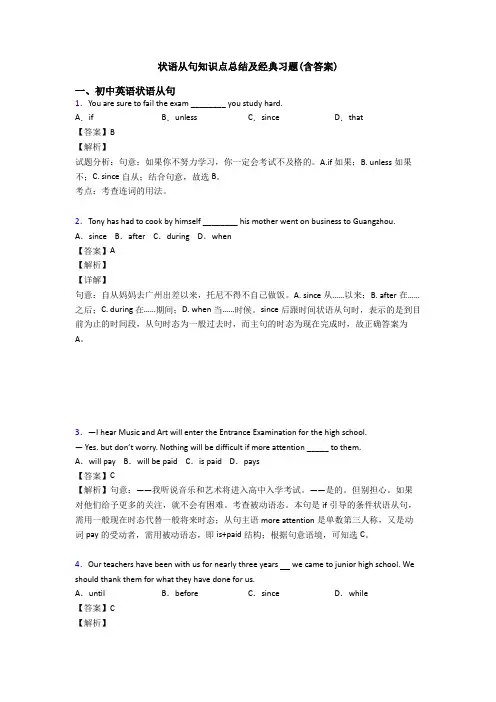
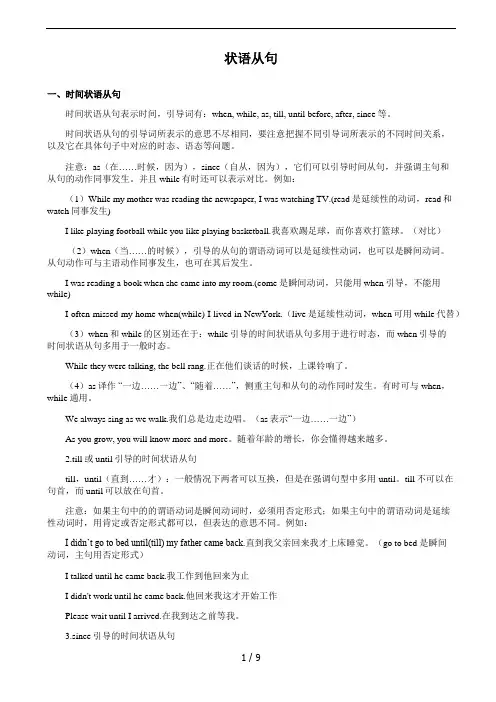
状语从句一、时间状语从句时间状语从句表示时间,引导词有:when, while, as, till, until before, after, since等。
时间状语从句的引导词所表示的意思不尽相同,要注意把握不同引导词所表示的不同时间关系,以及它在具体句子中对应的时态、语态等问题。
注意:as(在……时候,因为),since(自从,因为),它们可以引导时间从句,并强调主句和从句的动作同事发生。
并且while有时还可以表示对比。
例如:(1)While my mother was reading the newspaper, I was watching TV.(read是延续性的动词,read和watch同事发生)I like playing football while you like playing basketball.我喜欢踢足球,而你喜欢打篮球。
(对比)(2)when(当……的时候),引导的从句的谓语动词可以是延续性动词,也可以是瞬间动词。
从句动作可与主语动作同事发生,也可在其后发生。
I was reading a book when she came into my room.(come是瞬间动词,只能用when引导,不能用while)I often missed my home when(while) I lived in NewYork.(live是延续性动词,when可用while代替)(3)when和while的区别还在于:while引导的时间状语从句多用于进行时态,而when引导的时间状语从句多用于一般时态。
While they were talking, the bell rang.正在他们谈话的时候,上课铃响了。
(4)as译作“一边……一边”、“随着……”,侧重主句和从句的动作同时发生。
有时可与when,while通用。
We always sing as we walk.我们总是边走边唱。
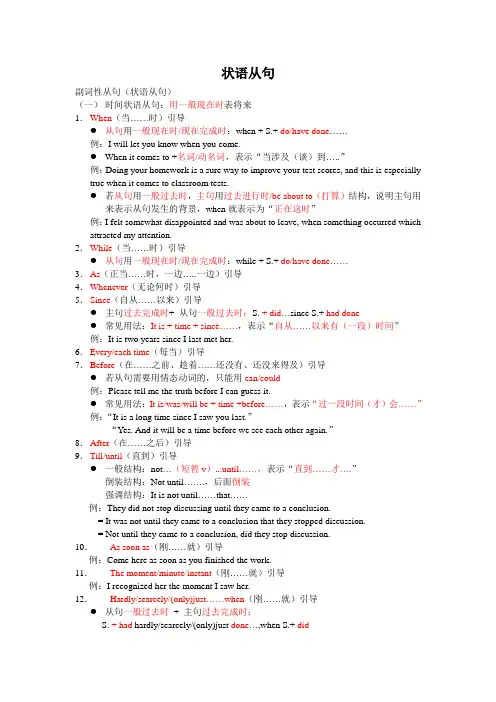
状语从句副词性从句(状语从句)(一)时间状语从句:用一般现在时表将来1.When(当……时)引导●从句用一般现在时/现在完成时:when + S.+ do/have done……例:I will let you know when you come.●When it comes to +名词/动名词,表示“当涉及(谈)到…..”例:Doing your homework is a sure way to improve your test scores, and this is especially true when it comes to classroom tests.●若从句用一般过去时,主句用过去进行时/be about to(打算)结构,说明主句用来表示从句发生的背景,when就表示为“正在这时”例:I felt somewhat disappointed and was about to leave, when something occurred which attracted my attention.2.While(当……时)引导●从句用一般现在时/现在完成时:while + S.+ do/have done……3.As(正当……时,一边…..一边)引导4.Whenever(无论何时)引导5.Since(自从……以来)引导●主句过去完成时+ 从句一般过去时:S. + did…since S.+ had done●常见用法:It is + time + since……,表示“自从……以来有(一段)时间”例:It is two years since I last met her.6.Every/each time(每当)引导7.Before(在……之前、趁着……还没有、还没来得及)引导●若从句需要用情态动词的,只能用can/could例:Please tell me the truth before I can guess it.●常见用法:It is/was/will be + time +before……,表示“过一段时间(才)会……”例:“It is a long time since I saw you last.”“Yes. And it will be a time before we see each other again.”8.After(在……之后)引导9.Till/until(直到)引导●一般结构:not…(短暂v)...until……,表示“直到……才….”倒装结构:Not until…….,后面倒装强调结构:It is not until……that……例:They did not stop discussing until they came to a conclusion.= It was not until they came to a conclusion that they stopped discussion.= Not until they came to a conclusion, did they stop discussion.10.As soon as(刚……就)引导例:Come here as soon as you finished the work.11.The moment/minute/instant(刚……就)引导例:I recognized her the moment I saw her.12.Hardly/scarcely/(only)just……when(刚……就)引导●从句一般过去时+ 主句过去完成时:S. + had hardly/scarcely/(only)just done…,when S.+ did●若hardly/scarcely/(only)just置于句首,主句须倒装(had+ S.+ done)例:He had hardly left school when it began to rain.=Hardly had he left school when it began to rain.13.No sooner……than(刚……就)引导●从句一般过去时+ 主句过去完成时:S. + had no sooner done…, than S.+ did●若no sooner置于句首,主句须倒装(had+ S.+ done)例:We had no sooner reached the top of hill than we all sat down to rest.=No sooner had we reached the top of hill than we all sat down to rest.(二)地点状语从句1.Where(在……地方)引导:从句用一般现在时例:Where there is smoke, there is fire.2.Wherever(无论在哪里)引导例:Wherever he may be, he will be welcome.(三)条件状语从句:用一般现在时表将来1.If(如果、假如)引导:用虚拟语气●if引导得从句中,若有were, had, should三词,可以省略if,并且倒装(谓语置前)例:If I had known about it, I would have told you.= Had I known about it, I would have told you.●If从句+主句= 祈使句/省略句+ and +…….例:If you give me some food, I won’t die of starvation(饥饿).= Some food and I won’t die of starvation;2.Suppose/supposing(假设)引导例:Suppose we cannot get the necessary equipment(设备), what shall we do? 3.Unless(除非、如果不)引导●Unless从句+主句= 祈使句/省略句+ or +…….例:Unless you give me another drink, I will die of thirst.= Another drink or I will die of thirst.4.As/so long as(只要)引导例:We can surely overcome these difficulties so long as we are closely united.5.If only/only if(只要)引导例:We can surely get gains, if only we work hard.6.In case/lest(万一)例:You should take good care of your kid, in case they are ill.7.Provided/Providing/Given that(假如)引导例:We will let you use the room provided that you keep it clean and tidy.8.On condition that(假如)引导(四)原因状语从句1.Because(因为)引导●表示“直接、唯一的原因”,通常放在句后,可以与not, but, only连用例:He was angry not because we were late but because we made a noise.2.As(因为)引导●表示“显而易见或大家都知道的原因”,语气较弱例:Everyone likes you as you are both kind and honest.3.Since(因为、既然)引导●表示“间接或附带的原因”,通常放在句首例:Since she insists, you must come.4.Now/seeing that(既然)引导例:Now/Seeing that you are all here, let’s try and reach a decision.5.Considering that (考虑到)引导例:Considering that he began learning English only a year ago, he speaks very well. 6.In that(由于、因为)引导例:He was late in that he didn’t catch the first bus.(五)让步状语从句1.Though/although/as(虽然)引导●Though/although…..yet连用,表示“虽然…..但是……”例:Though/although we cannot see air, (yet) it exists everyone.●as引导得从句置于句首,且倒装(表语、状语、动词置于as前)表语倒装:可以省略冠词例:Tried as I was, I stayed up late studying last night.Children as he is, he knows a lot of English.状语倒装:Fast as he read, you can’t finish novel in three days.谓语动词倒装:Try as he would, he couldn’t lift the rock.2.Even if/though(即使)引导例:Nobody lost his patience as though the meeting was long and boring. 3.However/no matter how(无论如何/怎样)引导例:We’ll continue to work, no matter how/however hot it is.4.Whatever/no matter what(无论什么)引导例:Whatever/no matter what r you may do, do your best.5.Whoever/no matter who(无论谁)引导例:Whoever/no matter who all cannot break the rules, we must keep the law. 6.Whether……or/no matter whether…..or….(不管……还是)引导例:Whether/no matter whether you can do or cannot do, you must try it. 7.Whether or not/whether……or not(不管是否……)引导例:Whether or not we had a baby, we couldn’t survive only on my salary.= Whether we had a baby or not, we couldn’t survive only my salary.(六)方式状语从句1.As(如,按照)引导例:When in Roma do as the Romans do.2.Just as(正如)引导例:Most plants need air just as they need water.3.As if/though(好像,仿佛)引导●引导的从句常用虚拟语气,除了叙述的情况实现的可能性较大例:He speaks English as if/though he were an Englishman.例:It looks as if/though the coming autumn harvest will be even better than the last one. (七)目的状语从句1.So that(以便、为了)引导●从句中谓语部分可以用can/could,may/might例:I will give you my phone number, so that you can call me when you arrive here. 2.In order to(以便、为了)引导●从句中谓语部分只能用may/might例:We should do our utmost最大可能in order that we may be able to overfulfil 超额完成the task.3.For fear that/lest(以免、以防)引导●从句用虚拟语气“should +V.”例:Batteries 电池must be kept in dry place for fear that/lest electricity should leak 渗漏away.4.In case(以免、以防)引导●从句中谓语部分不用虚拟语气例:Better take more clothes in case the weather is cold.(八)结果状语从1.that(因而)引导例:What’s the matter that they still haven’t answered our e-mail?2.so that(因而)引导●主句,+ so that,且从句中谓语部分只能用may/might例:The temperature is increased , so that the volume of the gas can become greater. 3.So…..that(如此……以至)引导●so +形容词/副词+a/an+名词+ that例:It is so hot a day that we cannot sleep.●so置于句首时,需倒装状语例:So fast did he run that I could not keep up with him●so + much/little/few/many + that,而不用such…..that例:She has so little education that she is unable to get a job.4.Such…..that(如此……以至)引导●Such +名词(可数的单数名词)+ that例:It is such a lovely day that everybody is feeling happy and gay.(九)比较状语从句1.Than(比……)引导例:There are more vocabularies in this unit than in that one.2.As……as(如……一样)引导●As +形容词/副词+a/an+名词+ as + 省略句例:He is as clever a boy as his brother.例:This book is nearly as thick as that one(is).3.Not so……as(不如……一样)引导●As +形容词/副词+a/an+名词+ as + 省略句例:You are not as tall as she.4.The+比较级,the+比较级(越……越…….)引导例:The hotter that air becomes, the lighter it gets.例题1、()______ your daughter has not come back , let me take you to the Friendship Hospital.A WhenB SinceC ThatD For2、()______ Tom is not feeling well today , he has to stay at home.A ThoughB ForC FindingD As3、()They are ______ hard-working students that they have already made ______ much progress since thay came here.A so ; soB such ; suchC so ; suchD such ; so4、()______ we have finished the book we shall start doing some exercises.A For nowB Since nowC Now thatD Since now5、()He asked us not to be noisy ______ we should wake the baby.A in cseB in the caseC in case ofD in this case巩固练习1、()______ you are familiar with the auther`s ideas , by reading all the sections as quickly as you can.A Ever sinceB As long asC So thatD Now that2、()The boy has to learn ______ things that he hardly has time for play.A so manyB such manyC so fewD such few3、()In the old days the poor worker worked long hours every day ______ he could support his whole family.A becauseB thoughC unlessD so that4、()Tell him that I will call him back , ______ he gives me a call.A in most casesB in caseC in any caseD in case of5、()______ you have reminded me , I will try to be a teacher.A Now thenB So thatC Now thatD In order that6、()You will have to study for many years ______ you may become a brain surgeon.A in order thatB in thatC althoughD soKey 1~5 BDDCA 1~6 DADBCA二、习题1、()It is almost impossible to become skilful in speaking a language ______ you use it constantly.A but forB if onlyC exceptD unless2、()Everything will be all right ______ Tom is left to do the work in his own way.A as far asB mean whileC so long asD in case3、()Do remind me of the date again tomorrow ______ I forget.A in caseB except thatC even ifD as though4、()You must do the experiment ______ the teacher told you.A asB sinceC so thatD unless5、()I could not resist having another piece of cake even ______ I was supposed to lose weight.A althoughB howeverC otherwiseD though6、()______ I suggest , he always disagree.A WhatB HowC WhateverD How a7、()However ______ you hate them , you must work with them.A very muchB too muchC much tooD much8、()Try ______ he might , Tom could not get out of the trouble.A as ifB altoughC ifD as9、()______ whales are very large , they are no longer an even match for man.A SinceB BecauseC Now thatD Although10、()Man must have food just ______ plants must have sunlight.A forB likeC becauseD as巩固练习1、()______ I know , the visitors are all satisfied with the arrangement in the next few days.A As far asB As long asC As well asD As soon as2、()______ convincing an argument is , it needs support of evidence.A No matterB ThoughC HoweverD As3、()Anyone can borrow books from the library ______ he has a library card.A so long asB sinceC even thoughD unless4、()______ much advice I gave him , he did exactly what he wanted to do.A HowB WhateverC WhatD No matter how5、()Remember , science requires your whole life ______ you had two lives to give , they would not be enough.A AlthoughB ThoughC If onlyD Even if6、()I am sure that Laura`s latest play , ______ staged , will prove a great success.A sinceB unlessC onceD until7、()Send us a message , ______ you have any difficulty.A in case thatB in caseC whileD as8、()Electricity flows through a wire ______ water flows through a pipe.A whileB just asC much asD whenever9、()Food shortage will long be a world problem ______ much has been done to supply enough for everyone.A althoughB evenC no matterD since10、()I do not like the city , ______ though I have been living here for more than ten years.A evenB asC everD butkey1~5 DCAAD 6~10 CDDDD 1~5 ACADD 6~10 CBBAA。
(英语)初中英语状语从句及其解题技巧及练习题(含答案)一、初中英语状语从句1.– You bought the car about ten years ago?-- Yes. it’s old, it still runs well.A.Because B.Since C.Although D.But【答案】C【解析】【详解】句意:——你十年前买的车?——是的。
虽然它很旧,但它仍然运行良好。
考查连词辨析。
A. Because因为,引导条件状语从句,前后句是因果关系;B. Since自从……以来,引导时间状语从句;C. Although虽然,尽管,引导让步状语从句,前后句是转折关系,although后面句子表示让步条件;D. But但是,并列连词,连接并列句,前后句转折关系。
根据句意可知前后句是转折关系,前句表示让步条件;故选C。
2.--- Do you know what time Daniel Xuzhou tomorrow?---At 2:00 p. m. I will meet him when he at the airport.A.gets to; arrives B.will get to; will arriveC.will get to; arrives D.gets to; will arrive【答案】C【解析】句意:——你知道丹尼尔明天什么时候去徐州吗?——下午2:00点。
当他到达机场时我将与他会面。
第一句是what time引导的宾语从句,主句是一般现在时,从句时态不受限制,结合tomorrow用一般将来时will+动词原形;第二句是when引导的时间状语从句,遵循主将从现的规则,所以从句用一般现在时,主语是he,因此是arrives;结合选项,故答案选C。
3.--Where is the comic book?--I brought it to you ________you were in the reading room yesterday.A.when B.if C.because D.before【答案】A【解析】句意:-漫画书在哪里?-昨天当你在阅览室的时候我就拿给你了。
初中英语状语从句的技巧及练习题及练习题(含答案)一、初中英语状语从句1.They will lose the game _______ they try their best.A.unless B.once C.since D.after【答案】A【解析】【详解】试题分析:句意:他们会输掉比赛的,除非他们尽自己最大的努力。
lose the game 输掉比赛,try one’s best 尽最大的努力。
A. unless 除非; B. once 一次;C. since 因为; D. after 在…之后,根据题意可知此句是unless引导的条件状语从句,故选A。
2.--- Do you know what time Daniel Xuzhou tomorrow?---At 2:00 p. m. I will meet him when he at the airport.A.gets to; arrives B.will get to; will arriveC.will get to; arrives D.gets to; will arrive【答案】C【解析】句意:——你知道丹尼尔明天什么时候去徐州吗?——下午2:00点。
当他到达机场时我将与他会面。
第一句是what time引导的宾语从句,主句是一般现在时,从句时态不受限制,结合tomorrow用一般将来时will+动词原形;第二句是when引导的时间状语从句,遵循主将从现的规则,所以从句用一般现在时,主语是he,因此是arrives;结合选项,故答案选C。
3.-Have you improved your spoken English?-Not yet.I'll try my best______I am not good at it now.A.so B.although C.but D.until【答案】B【解析】【详解】句意:——你提高你的英语口语了吗?——还没有.虽然我现在还不擅长,但是我会尽力的.考查连词辨析。
英语中状语从句共有9大类,分别是:本节课我们学习其中的条件状语从句。
目录:一、概念;二、时态;三、条件状语从句的引导词;(一)if 引导的条件状语从句;(二)unless引导的条件状语从句;(三)as /so long as引导的条件状语从句;(四)once引导的条件状语从句;四、条件状语在句中的位置;五、转换;六、拓展;七、综合练习;一、概念在某种条件下,可能发生某事。
由if/unless等引导的表示条件的句子,就叫条件状语从句。
e.g:If you put wood into water, it floats.如果你把木头放到水里,它就会浮起来。
Unless you keep ice cream in a fridge, it melts.除非你把冰淇淋放进冰箱,不然它就会融化。
二、时态1.当主句和从句所表示的是原理、客观真理、规则时,主句是一般现在时(包括祈使句和含有情态动词can/may/must等),从句也要用一般现在时。
例如:1) If you put a piece of paper into water, it gets wet.如果你把一张纸放进水中,它会变湿。
(原理)2)Be careful if you cross the road.(祈使句)3) You must see the doctor if you are ill.( 含有情态动词)2. 在if条件状语从句中,如果从句谈论的是一个可能发生的事实及其产生的相关结果,主句用一般将来时,从句用一般现在时。
e.g:1) If it rains tomorrow, we will not go to the zoo.2) If you go to bed earlier, you won't feel tired in the morning.3. 如果从句用现在进行时或现在完成时,主句需用一般将来时。
1)If you are looking for Peter you’ll find him upstairs.如果你是在找彼得,上楼就会找到他。
初中条件状语从句(附答案)条件状语从句是由连接词if或unless引导的从句。
在含有条件状语从句的复合句中,如果主句是一般将来时态,从句要用一般现在时。
if和unless是常用的引导词。
if引导的条件状语从句有真实条件句和非真实条件句两种。
真实条件句表示在某种条件下某事很可能发生,而非真实条件句是虚拟语气的一种,表示与事实相反、不可实现的条件或根本不存在的条件。
在真实条件句中,if后面的从句要紧跟着,放在前面,逗号要放在句中间。
主句多用将来时。
在非真实条件句中,从句多用一般过去时或过去完成时。
unless是if。
not的固定搭配,意为除非、若不、除非在。
的时候。
例如,You will fail to arrive there in time unless you start earlier。
= If you don't start earlier。
you will fail to arrive there in time。
除非你早点动身,否则你就不能及时赶到那儿。
1.If you feel tired。
you have to have a rest.2.Where will he see the film if he has time?3.If there were fewer trees。
there would be XXX.4.XXX if he did not work on XXX.5.If Marcia lived alone。
she would keep a pet parrot.na will buy a new dress if the old one is out of style.7.XXX.If we _____________ a birthday party for him。
everyone_____________ come。
8.I would have a bake sale if I XXX。
初中英语:条件状语从句一. 条件状语从句的概念条件状语从句,即在某种条件下,一件事情可能发生。
在英语中由连接词if或unless等引导的状语从句叫做条件状语从句。
条件是指某一件事情实现之后(状语从句中),一件事情(主句)才能发生,通常译作假如,只要,如果”等意思。
条件状语从句中,主从句的时态要遵循生将从现”的原则。
即,主句是将来时态时,从句用一般现在时代替将来时态。
二. 条件状语从句的引导词1.If conj .如果,假如If you ask him , he will help you . 如果你请他帮忙,他会帮你的。
If you fail in the exam , you will let him down . 如果你考试不及格,你会让他失望的。
2. ............................................................ unless conj.除非,若不,除非在的时候(if...not...)You will fail to arrive there in time unless you start earlier. 如果你不早点动身,你就不能及时赶到那儿。
Unless it rains, the game will be played. 除非下雨,比赛将照常进行。
3. so/as long as conj. 只要You may borrow my book as long as you keep it clean.只要你保持书的清洁,你就可以把我的书借去。
三. 关丁条件句的时态,常见的有以下三种情况:1、条件状语从句的主句是一般将来时,那么从句常常用一般现在时。
When I grow up, I ' ll be a nurse and look after patients.我长大后要当一名护士,照顾病人。
2、如果主句是祈使句,那么从句通常要用一般现在时。
语法点拨:if与unless引导的条件状语从句
1.常用引导词:if(如果),unless(除非)。
I won’tgo to the movies unless I am fre
e tomorrow.
除非我明天有空,否则我不会去看电影。
2.条件状语从句的位置
可放在句首或句尾,放在句首时常用逗号与主句隔开。
e.g.If it rains tomorrow, I will stay at home.
= I will stay at home if it rains to
morrow.
如果明天下雨我就呆在家里。
3.if引导词用法
if引导的条件句有:真实条件句和非真实条件句两种。
真实条件句:表示在某种条件下某事很可能发生。
e.g.Ifyou ask him, he will help
you.
如果你请他帮忙,他会帮你的。
4.unless引导词用法
固定搭配:unless=if...not除非,若不,如果不 e.
g.You will fail to arrive therein ti
meunless you start earlier.
=If you don’t start earlier, you will f
ail toarrive there in time.
如果你不早点动身,你就不能及时赶到
那儿。
注意:在含有条件状语从句的复合句中,当主句是一
般将来时态,从句要用一般现在时(即主将从现原
则)。
如果主句是祈使句或含有情态动词时,从句也
用一般现在时表将来。
e.g.If you study hard, you willpass t
he exam.
1.Iwillsend youane-mail assoonasI____A___inCanada.
A.arriveB.arrived C.am arriving D.will arrive
2.If there____A___no buyingand selling ofanimals,there______no killinginnature.
A.is;willbeB.willbe;will be C.is;isD.will b e;is
3.I’mwaitingformyfriend.__C___,I'll goshopping alone.
A.Ifshe comes B.If she won'tcome C.If she does n'tcome
5.You can’t watch TV___A_____you finish yourhomework.
A.unless
B.if
C.while
D.as
7.Thestudents_____A___have a sports meetin
g this weekend if it___.
A.won’t;rains B.will;rains
C.won’t;willrainD.are going to;isgoingtorain
9.I don't knowif she____B___tomy birthday party to morrow.If she______,I'll beveryhappy.
A.comes;comes B.will come;comes es;willcome
10.—When will youcome to Daqing?—Iwill call you___D__Iarrive.
A.till B.while C.as quicklyas D.assoon as
11.I’ll give it to Jimas soon as I___C____him tomorrow.
A.sawB.willsee C.see D.have seen。